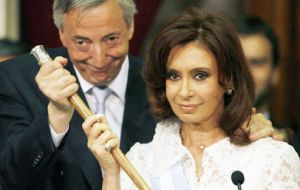MercoPress. South Atlantic News Agency
The Economist: Cristina Fernández should build bridges to her opponents, or risk leaving office early
 As the Bourbons, the Kirchners learned nothing and forgot nothing from Argentina’s failed statist protectionism of the past
As the Bourbons, the Kirchners learned nothing and forgot nothing from Argentina’s failed statist protectionism of the past Under the heading of 'Cristina’s come-uppance', The Economist comments the result of the midterm election in Argentina and makes a forecast of the possible future scenarios in the next two years
Power in Argentina is like mercury. It drains swiftly from troubled leaders, flooding towards their most likely successors. That is the prospect facing the president, Cristina Fernández de Kirchner, after a mid-term congressional election on October 27th. Having driven her country’s economy close to a precipice, she still has two more years in office. They look as if they will be bumpy ones—even assuming she makes a full recovery from the head injury that prevented her campaigning during the last four weeks.
On paper, Ms Cristina Fernández did not fare badly in the election. She retained a narrow majority in Congress. Her opponents are divided three ways. Her group within Argentina’s all-embracing Peronist movement remains the country’s largest single political force. But it won only 33% of the vote, down from the 54% she secured in winning a second term in 2011. In politically crucial Buenos Aires province, it was trounced by a rival Peronist list led by Sergio Massa, who served as Ms Fernández’s cabinet chief before breaking with her.
The election has killed off any lingering hope the president might have had of lifting term limits to allow her to run again in 2015, a measure that would need the backing of two-thirds of Congress. And she has no obvious successor. To a more consensual leader, none of this would matter much. But Ms Fernández and her late husband and predecessor, Néstor Kirchner, have ruled Argentina since 2003 through permanent confrontation—with bondholders, the IMF, political opponents, the media and, lately, the judiciary. Their main weapon was a booming economy. They were fortunate to preside over a surge in the world prices of farm exports from the bountiful Pampas. They shoveled the proceeds into public employment, loss-making state companies and welfare programs.
To keep this show on the road, Ms Fernández’s government abandoned common sense. It lied about inflation. It imposed price and exchange controls, as well as import curbs. It expropriated the controlling stake held by Repsol of Spain in YPF, an oil company. As Talleyrand said of the Bourbons, the Kirchners learned nothing and forgot nothing from Argentina’s failed statist protectionism of the past.
The road is now running out: growth has slowed to a crawl, the bill for energy imports is mounting and the black-market exchange rate is 60% higher than the official one. The most closely watched statistic in Buenos Aires is the level of usable international reserves—which, at around 25 billion dollars, are barely enough to last two years on present trends.
Argentines have begun to lose faith in the Kirchner model. Ms Fernández’s instincts remain intransigent: to press on regardless of the economic damage and let her successor pick up the pieces. Yet a controlled retreat and a recognition that a political transition has begun would be in her own interests as well as her country. After this election many people will no longer feel so intimidated by her. Her majority in Congress may melt away. As her grip weakens, there is a danger that Argentina topples into a familiar spiral of inflation and devaluation. If so, she risks being driven from office prematurely.
To prevent this requires Ms Fernández to dump some of the bullies, cronies and Marxists through whom she governs and to start building bridges to her rivals and opponents. It would mean dismantling the most destructive economic controls, cleaning up official statistics and settling with holdout bond investors and Repsol. Impossible? Ms Fernández might recall that the Bourbons came to a sticky end.




Top Comments
Disclaimer & comment rules-

-

-

Read all commentsArgentina needs to dump the Kirchners altogether, before the rest of the world decides to dump Argentina!
Nov 05th, 2013 - 10:22 am 0The best thing that can happen is to have her ruling the country for two additional years until 2015.
Nov 05th, 2013 - 12:21 pm 0I would enjoy seeing her facing the problems she created. Otherwise, a new president, most probably for other party will have to try to solve them.
In addition, Argentine people must, grow up and become an adult and think well before choosing presidents.
Let's enjoy CFK and her “team” until 2015....
History will be the judge and it won't be kind.
Nov 05th, 2013 - 12:24 pm 0Commenting for this story is now closed.
If you have a Facebook account, become a fan and comment on our Facebook Page!